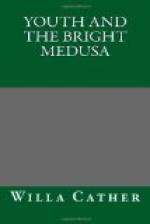That winter was a very cold one, and I think the even temperature of the house enslaved Bouchalka. “Imagine it,” he once said to me when I dropped in during a blinding snowstorm and found him reading before the fire. “To be warm all the time, every day! It is like Aladdin. In Paris I have had weeks together when I was not warm once, when I did not have a bath once, like the cats in the street. The nights were a misery. People have terrible dreams when they are so cold. Here I waken up in the night so warm I do not know what it means. Her door is open, and I turn on my light. I cannot believe in myself until I see that she is there.”
I began to think that Bouchalka’s wildness had been the desperation which the tamest animals exhibit when they are tortured or terrorized. Naturally luxurious, he had suffered more than most men under the pinch of penury. Those first beautiful compositions, full of the folk-music of his own country, had been wrung out of him by home-sickness and heart-ache. I wondered whether he could compose only under the spur of hunger and loneliness, and whether his talent might not subside with his despair. Some such apprehension must have troubled Cressida, though his gratitude would have been propitiatory to a more exacting task-master. She had always liked to make people happy, and he was the first one who had accepted her bounty without sourness. When he did not accompany her upon her spring tour, Cressida said it was because travelling interfered with composition; but I felt that she was deeply disappointed. Blasius, or Bla[vz]ej, as his wife had with difficulty learned to call him, was not showy or extravagant. He hated hotels, even the best of them. Cressida had always fought for the hearthstone and the fireside, and the humour of Destiny is sometimes to give us too much of what we desire. I believe she would have preferred even enthusiasm about other women to his utter oisivete. It was his old fire, not his docility, that had won her.
During the third season after her marriage Cressida had only twenty-five performances at the Metropolitan, and she was singing out of town a great deal. Her husband did not bestir himself to accompany her, but he attended, very faithfully, to her correspondence and to her business at home. He had no ambitious schemes to increase her fortune, and he carried out her directions exactly. Nevertheless, Cressida faced her concert tours somewhat grimly, and she seldom talked now about their plans for the future.




